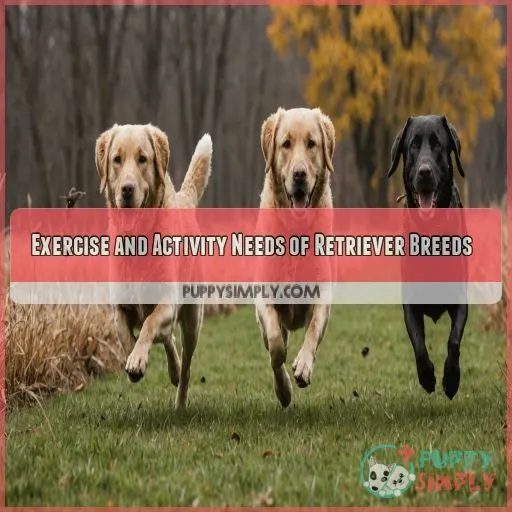This site is supported by our readers. We may earn a commission, at no cost to you, if you purchase through links.

Labrador Retrievers are often top picks, known for their intelligence and boundless energy.
Golden Retrievers are another fan favorite, excelling in both waterfowl and upland game hunting.
If you’re after a tough water dog, consider the Chesapeake Bay Retriever.
For smaller spaces, the versatile Boykin Spaniel might be your perfect match.
Whether you’re wading through marshes or trekking across fields, there’s a retriever breed that’ll have your back (and your birds).
Ready to discover which furry companion will be your ultimate hunting partner?
Table Of Contents
- Key Takeaways
- Key Characteristics of Retriever Breeds
- Hunting Styles and Retriever Breeds
- Retriever Breeds by Size and Strength
- Retriever Breeds and Family Life
- Grooming and Health Needs of Retriever Breeds
- Training and Socialization for Retriever Breeds
- Exercise and Activity Needs of Retriever Breeds
- Choosing the Right Retriever Breed for You
- Bringing Home Your New Retriever Puppy
- Frequently Asked Questions (FAQs)
- Conclusion
Key Takeaways
- You’ll want to match your retriever breed to your hunting style – Labs and Goldens are all-stars for waterfowl, while Boykin Spaniels might be your ticket for upland game. It’s like picking the right dance partner for your favorite hunting jig!
- Don’t forget to consider your lifestyle when choosing a breed. A high-energy Chesapeake Bay Retriever might run circles around you if you’re more of a Netflix marathoner than an outdoor enthusiast.
- Training and socialization are your golden tickets to success. Start early, be consistent, and remember – a well-trained retriever is like a Swiss Army knife in the field, ready for anything you throw its way.
- Your retriever’s health is a big deal, so keep an eye out for breed-specific issues like Hip Dysplasia. Regular vet check-ups and a proper diet will keep your furry hunting buddy in top shape for years to come.
Key Characteristics of Retriever Breeds
When you’re searching for the perfect retriever breed to join you on hunting trips, you need to think about their unique characteristics and how they’ll fit your needs. From intelligence and trainability to energy level and loyalty, understanding these traits will help you choose a breed that’s a great hunting companion but also a loving and loyal friend.
Intelligence and Trainability
Retriever breeds are known for their smarts, but every dog is different. Here’s what to think about when choosing a retriever:
- Retriever IQ: Look for breeds known for their high intelligence, like Labradors and Golden Retrievers.
- Breed differences: Each breed has its own way of learning and training needs.
- Training challenges: Be ready to change your training approach based on your dog’s personality and strengths.
Energy Level and Endurance
You want a retriever that can keep up with your hunting adventures. Energy level and endurance are really important when choosing a breed. Here’s a snapshot of what you can expect:
| Breed | Energy Level | Endurance |
|---|---|---|
| Labrador Retriever | High | Excellent |
| Chesapeake Bay Retriever | Medium | Good |
| Golden Retriever | High | Excellent |
Loyalty and Temperament
Retrievers are known for their loyalty and temperament. You want a hunting dog that’s got your back, and retrievers deliver. Their friendly, outgoing personalities make them perfect for families and hunting buddies alike. With proper training, they’ll be by your side through thick and thin, building trust and loyalty that’s hard to match.
Physical Characteristics and Grooming
Most retrieving dogs have short, water-resistant coats that need minimal grooming.
A hound glove or soft-bristled brush is perfect for keeping their coats healthy and shiny.
Breeds like the Chesapeake Bay Retriever have a double coat, so more frequent brushing is needed to keep shedding under control.
As for bathing, these dogs typically only need a bath when they get particularly dirty on hunting trips.
Hunting Styles and Retriever Breeds
Whether you’re a waterfowl hunter or prefer upland game, the right retriever breed can make all the difference. Let’s explore the best dog breeds for different hunting styles and find your perfect four-legged hunting partner.
Waterfowl Hunting
For duck hunting or goose hunting, your retriever’s skills are absolutely essential.
Decoy setup and blind placement are important, but even the best setups are useless without a good retriever.
Waterfowl hunting needs dogs with sharp eyes, strong swimming skills, and soft mouths for gentle retrieval.
The Chesapeake Bay Retriever is a waterfowl specialist, with a tough, water-resistant coat and a history of market hunting.
They’re loyal and tough, but remember gentle training works best with these softies at heart.
Upland Game Hunting
Upland game hunting requires a dog that can adapt to different terrain and has a keen sense of smell for upland bird identification.
The Golden Retriever is a top pick for this style of hunting.
Their strong noses and willingness to please make them excellent hunting partners.
They can locate and retrieve downed birds efficiently.
With proper scent training, your Golden will be an upland game-hunting pro.
Hunting in Heavy Cover
When hunting in heavy cover, you need a dog that’s up for the challenge.
Look for breeds with a strong prey drive.
The American Water Spaniel is a compact and versatile dog ideal for small boats and tough conditions.
The Curly-Coated Retriever, with their tight curls, sheds water and debris, making them ideal for heavy cover.
And don’t forget the Chesapeake Bay Retriever, a real workhorse with a double coat built for harsh conditions.
These breeds will help you tackle any heavy cover situation.
Hunting in Lighter Cover
Hunting in lighter cover demands a different set of skills from your retriever. You’ll want a dog that can navigate sparse vegetation and track birds with ease. Consider breeds like:
- English Setter: excels in lighter cover with its keen nose and agile physique
- Brittany Spaniel: a compact, energetic breed perfect for flushing birds in open terrain
- German Shorthaired Pointer: a versatile hunter with a strong prey drive and excellent tracking abilities
Retriever Breeds by Size and Strength
When choosing a retriever breed, you’ll want to think about the dog’s size and strength to make sure it can handle the demands of your hunting style.
From small but mighty breeds like the American Water Spaniel to larger breeds like the Labrador Retriever, we’ll break down the best retriever breeds by size and strength to help you find the perfect companion for your next hunt.
Small to Medium Sized Retrievers
If you’re looking for a smaller retriever, you have some great options. The Boykin Spaniel, Brittany Spaniel, and American Water Spaniel are all fantastic choices. These breeds are perfect for hunters who need a smaller, agile dog that can keep up with them in tight spaces. Their strong retrieving drive and trainability make them a joy to work with.
Medium to Large Sized Retrievers
Looking for a retriever that’s just right? Medium to large sized breeds like the Golden Retriever and Labrador Retriever are perfect for hunters who need a reliable companion. With their strong instincts and high energy levels, they excel in waterfowl and upland game hunting. Train them well, and they’ll be your loyal sidekick in no time.
Large to Extra Large Sized Retrievers
If you’re looking for a large or extra-large retriever, these breeds are your best bet.
- Large breed retriever training: These dogs need proper training to channel their energy and size.
- Retriever health concerns: Larger retrievers may be prone to joint issues, so keep their weight in check.
Retriever Breeds and Family Life
While retrievers are known for their hunting prowess, many also make fantastic family pets. In this section, we’ll explore the best retriever breeds for those with active family lives, young children, or space limitations.
Family-Friendly Retriever Breeds
If you’re looking for a retriever that’s a perfect fit for your family, you’ll want a breed that’s not just good with people but also adaptable to your lifestyle. Here’s a table with some of the most popular family-friendly retriever breeds, along with their key characteristics:
| Breed | Energy Level | Adaptability |
|---|---|---|
| Labrador Retriever | High | Easy to train, friendly |
| Golden Retriever | Moderate | Intelligent, obedient |
| Chesapeake Bay Retriever | High | Loyal, tough |
| Boykin Spaniel | Moderate | Versatile, loyal |
| German Shorthaired Pointer | Very High | Friendly, smart |
Breeds Suitable for Small Children
If you’re looking for a breed that’s good with small children, you’ll want a gentle giant with a patient temperament.
Labrador Retrievers and Golden Retrievers are top picks, as they’re naturally great with kids and easy to train.
With proper training, your hunting dog can double as a loving companion dog.
Breeds Suitable for Active Families
If you’re an active family looking for a retriever breed that can keep up with your adventurous lifestyle, consider a Labrador Retriever or Golden Retriever.
These breeds excel in dog parks and love family activities like hiking and swimming.
With regular exercise and training, they’ll be your perfect hunting companion and loving family friend.
Train them well, and they’ll be by your side for years to come.
Breeds Suitable for Apartment Living
You’re an apartment-dwelling hunter, no problem! Consider a smaller retriever breed like the American Water Spaniel or Boykin Spaniel. They’re quiet, adaptable, and need less space to exercise. Train them with short, fun sessions in your living room or local dog park alternatives. These breeds will keep you company and still deliver on hunting days.
Grooming and Health Needs of Retriever Breeds
You’re getting close to bringing home your new retriever, but before you do, you need to think about their grooming and health needs to make sure you can give them the best life.
You’ll want to consider their coat types and grooming needs.
You should also think about common health issues and diet requirements.
Understanding these aspects will help you choose the right breed for you and keep your new furry friend happy and healthy.
Coat Types and Grooming Needs
Retriever breeds can differ a lot when it comes to their coat types and grooming needs.
You’ll want to think about how much they shed, how water-resistant their coat is, and how often you’ll need to brush them.
Some breeds, like Labradors, shed a ton, while others, like American Water Spaniels, have hypoallergenic options.
Be prepared for seasonal changes and brush your retriever regularly to prevent matting and tangling.
Common Health Issues in Retriever Breeds
As a hunter and retriever owner, you want to make sure your furry friend stays healthy and happy. Unfortunately, retriever breeds are prone to certain health issues. Here are four common ones to watch out for:
- Hip dysplasia: A genetic condition that can lead to arthritis and mobility issues.
- Elbow dysplasia: Similar to hip dysplasia, but affecting the elbows.
- Allergies: Skin allergies and food allergies are common in retrievers.
- Ear infections: Those adorable floppy ears can trap moisture, leading to infections.
Stay on top of these potential issues to keep your hunting buddy in top shape!
Diet and Nutrition for Retriever Breeds
When it comes to diet and nutrition for retriever breeds, you want to fuel their high-energy lifestyle. Choose a balanced dog food rich in protein, moderate in fat, and low in carbs. Consider supplements for joint health and allergies. Monitor their weight to prevent obesity. A well-fed retriever is a happy hunting buddy, after all!
Training and Socialization for Retriever Breeds
As you bring home your new retriever puppy, you’re probably thinking about how to turn that bundle of energy into a great hunting buddy.
It all starts with training and socialization.
With patience, consistency, and positive reinforcement, you can help your retriever develop the skills and confidence they need to excel in the field and become a loyal companion.
Importance of Early Socialization
- Builds confidence in new situations
- Prevents fear-based behaviors
- Enhances adaptability in various environments
- Fosters positive relationships with humans and other dogs
Don’t miss those critical fear periods! Get your retriever out there, meeting new faces and exploring new places. Trust me, a well-socialized hunting dog is a happy hunting partner.
Basic Obedience Training
Ready to turn your retriever into a well-behaved hunting companion?
Start with the basics!
Teach your pup to sit, stay, and come using positive reinforcement.
Keep training sessions short and fun – think of it as bonding time.
Consistency is key, so practice daily.
Patience and treats will get you there!
Advanced Training for Hunting and Agility
Once your retriever’s got the basics down, it’s time to kick things up a notch. Advanced training for hunting and agility will sharpen your dog’s skills and strengthen your bond. Here are some key areas to focus on:
- Field trials to simulate real hunting scenarios
- Scent work for tracking game
- Water retrieves to perfect their swimming technique
- Obedience drills in distracting environments
- Agility courses to boost athleticism and problem-solving
Tips for Training a Strong-Willed Retriever
Got a headstrong retriever on your hands? Don’t sweat it! Consistency is your secret weapon.
Set firm boundaries, but keep things positive.
Use clear commands and watch that tail wag.
Stick to your guns, and soon you’ll have a retriever that’s happy to please and ready for the field.
Exercise and Activity Needs of Retriever Breeds
You’ll quickly discover that retriever breeds have boundless energy and enthusiasm for life. To keep your hunting companion happy and healthy, it’s really important to understand their exercise needs and provide plenty of mental and physical stimulation.
Daily Exercise Needs
Your hunting companion needs more than just a stroll around the block. Retrievers are high-energy dogs that thrive on regular, intense exercise. To keep your four-legged hunter in top shape, aim for:
- 1-2 hours of daily exercise
- A mix of running, swimming, and fetching
- Varied terrain to challenge their muscles and stamina
- Gradual increase in intensity as they grow
Mental Stimulation and Play
While daily walks are great, your retriever’s mind needs a workout too.
Think of it as mental calisthenics for your furry friend.
Puzzle toys can keep them entertained for hours, while brain games challenge their problem-solving skills.
Interactive games burn energy and strengthen your bond.
And don’t forget training games – they’re like hitting two birds with one stone, exercising both body and mind.
Activities Suitable for Retriever Breeds
Retrievers thrive on activities that challenge their bodies and minds. You’ll find these energetic pups love a good adventure. Here are some really fun activities to keep your retriever happy and healthy:
- Dock diving competitions – make a splash!
- Scent work trails – sniff out the fun
- Flyball races – fast-paced teamwork
- Frisbee catching – show off those aerial skills
- Canine obstacle courses – conquer the challenges
Whether you’re into hunting or just want a fit companion, these activities will keep your retriever’s tail wagging and skills sharp.
Avoiding Over-Exercise and Injury
Even though your retriever has tons of energy, it’s important to know when to call it a day.
Look out for signs of fatigue like heavy panting or lagging behind.
Mix up activities to keep your dog from getting bored and to prevent injuries.
Use training collars and leashes wisely, and watch those hunting dog training videos for safe exercise tips.
Your furry friend will thank you!
Choosing the Right Retriever Breed for You
You’ve narrowed down your search to retriever breeds, but now comes the tricky part – choosing the perfect one for you. Let’s walk through the key things to keep in mind when selecting your ideal hunting companion, from lifestyle fit to breed characteristics.
Assessing Your Lifestyle and Needs
Choosing the right retriever breed isn’t just about hunting prowess, it’s about finding a furry companion that fits your life like a glove. Before you jump into the hunting dog scene, take a good look at your lifestyle. It’s like picking the perfect dance partner; you need someone who can keep up with your rhythm!
Here’s what to think about:
- Your hunting experience (are you a newbie or a seasoned pro?)
- Time commitment (can you handle a high-energy pup?)
- Living space (apartment dweller or country living?)
- Activity level (couch potato or marathon runner?)
- Family dynamics (kids, other pets, or flying solo?)
Researching Breeds and Talking to Breeders
When you’re on the hunt for the perfect retriever, don’t just wing it. Dig deep into breed research and chat with reputable breeders. They’re goldmines of information about temperament, health issues, and hunting prowess. Here’s a quick guide to help you sniff out the right breed:
| Breed | Temperament | Health Concerns | Hunting Specialty | Training Ease |
|---|---|---|---|---|
| Labrador | Friendly, enthusiastic | Hip dysplasia | Waterfowl | High |
| Golden | Gentle, smart | Cancer | Upland game | High |
| Chesapeake Bay | Protective, tough | Eye issues | Cold water | Moderate |
| Flat-Coated | Optimistic, active | Cancer | All-around | Moderate |
| Curly-Coated | Independent, confident | Hip dysplasia | Waterfowl | Challenging |
Meeting the Parents and Puppies
When you visit the breeder, keep your eyes peeled for more than just adorable puppy faces.
Watch how the parents interact with you and their surroundings.
Are they friendly and well-behaved?
Take note of the litter size and how the pups socialize with each other.
A reputable breeder will be happy to show you health certificates and answer questions about their hunting dog’s field trial performance or hunt test results.
Making an Informed Decision
You’ve done your homework, now it’s time to pull the trigger on your perfect hunting companion.
Consider your hunting style, budget, and experience level.
Don’t bite off more than you can chew with a high-energy breed if you’re short on time.
Trust your gut and choose a retriever that’ll have your back in the field.
Bringing Home Your New Retriever Puppy
You’ve chosen your perfect retriever pup, and now it’s time to bring them home. Get ready for an exciting journey as you prepare your space, introduce your new furry friend to the family, and start those important first weeks of bonding and training.
Preparing Your Home and Family
Bringing home a new retriever puppy? It’s time to roll up your sleeves and get your house in tip-top shape! Dog-proofing isn’t just about hiding your favorite shoes; it’s about creating a pet-friendly environment that’ll make your furry friend feel right at home. Here’s a quick checklist to get you started:
- Secure loose wires and cords
- Remove toxic plants
- Store chemicals and medications out of reach
- Set up a cozy crate for training
First Few Weeks and Months
You’ve got your new retriever pup, and it’s time to get started!
Start with puppy socialization right away – it’s super important for building a well-rounded hunting companion.
Crate training and housebreaking should be top priorities, too.
Don’t forget those first vet visits and a gradual change in their food.
Join hunting dog training forums or groups for support – you’re not alone in this adventure!
Tips for Raising a Healthy and Happy Retriever
Raising a happy, healthy retriever is like nurturing a four-legged bundle of joy.
Start with early health checks and a solid nutrition plan.
Puppy socialization is really important – expose your furry friend to various sights, sounds, and smells.
Establish a consistent training schedule and grooming routine.
Before you know it, your pup will be ready for anything – from hunting to search and rescue.
Frequently Asked Questions (FAQs)
How long do retriever breeds typically live?
Like a loyal companion through life’s seasons, retriever breeds typically live 10-12 years. You’ll cherish a decade or more with your furry friend, but their lifespan can vary based on genetics, diet, and care.
Are retriever breeds prone to any specific genetic disorders?
You bet retriever breeds can face some genetic hiccups. Hip dysplasia‘s a big one, along with eye issues like progressive retinal atrophy. They’re also prone to certain cancers. Regular check-ups and responsible breeding help keep these pups healthy and happy.
Can retriever breeds be trained for non-hunting tasks?
While retrievers excel in hunting, they’re surprisingly versatile. You’ll find these smart pups thriving in non-hunting roles like therapy, search and rescue, and service work. Their intelligence and willingness to please make them adaptable to various tasks you’ll love.
What is the average cost of a purebred retriever puppy?
You’ll typically shell out $800 to $2,500 for a purebred retriever pup. Prices vary based on breed, pedigree, and breeder reputation. Don’t forget to factor in ongoing costs like food, vet bills, and training equipment!
How do retriever breeds perform in dog sports competitions?
You’ll find retrievers excel in various dog sports. They’re naturals at agility, obedience, and Dock Diving. Their intelligence and athleticism shine in flyball and freestyle competitions. Plus, they’re crowd-pleasers with their wagging tails and enthusiastic attitudes.
Conclusion
Choosing the best hunting dog breeds for retrievers is like finding the perfect dance partner – it takes skill, patience, and a bit of chemistry.
Whether you’re drawn to the ever-popular Labrador or the rugged Chesapeake Bay Retriever, remember that your choice should align with your hunting style and lifestyle.
With proper training and care, these loyal companions will retrieve your game but will also steal your heart.















